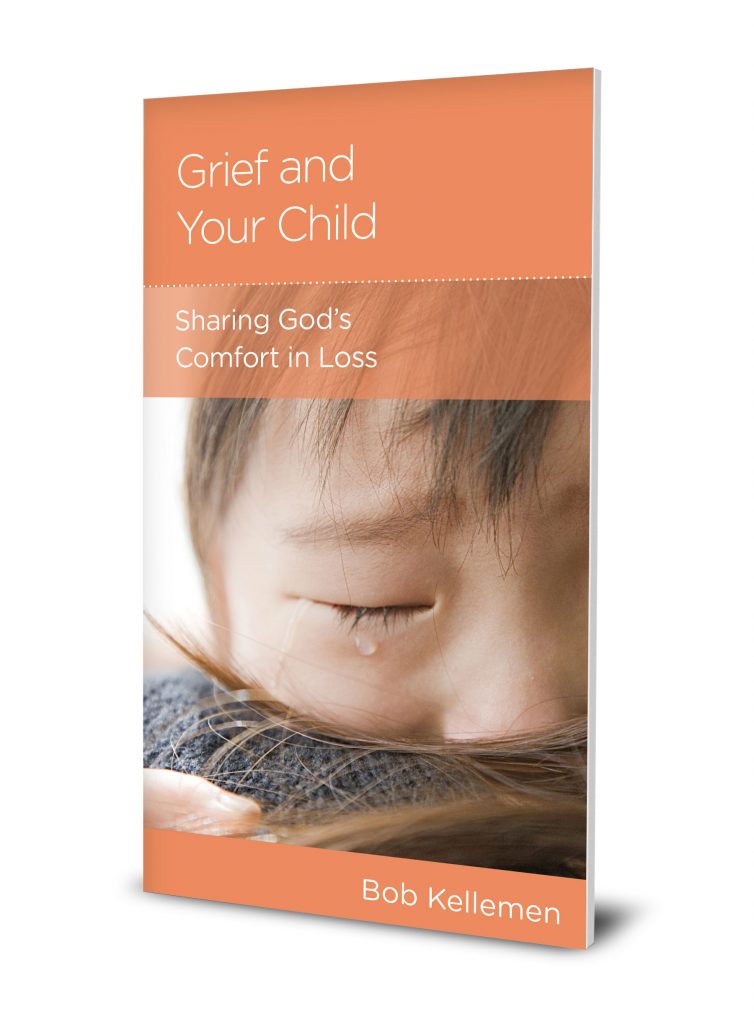When facing the death of a loved one, we often think about grief and how it affects adults, but what about when your children struggle with loss? How do you help them find hope when they’re hurting?
By applying these four biblical principles to the grief experience of children and teens, parents can help their kids find God’s healing hope in the midst of life’s painful losses.
#1: Face Your Grief Face-to-Face with Christ
You’ve heard the illustration about what flight attendants say concerning a flight emergency, “Adults, first put on your oxygen mask, and then put your child’s mask on them.” Without your oxygen mask, you’ll pass out and be no help to your child.
Likewise, if you’re not dealing with your own grief—in whatever losses you’re experiencing—you’ll be less helpful to your child. Recall 2 Corinthians 1:3–4: the God of all comfort comforts you in all your troubles, so that you can comfort those—like your child—in any trouble, with the overflow of the comfort you’ve received from God. The best comfort givers are those who have received God’s reassurance, peace, and help.
#2: It’s Normal to Feel Many Emotions
Death is an intruder. Grief has a piercing stinger that wounds deeply, invoking a variety of emotions, including sadness, fear, and anger. Here are some ways you can help your child navigate the pain of loss:
Allow your child to vent and lament. Don’t force your son or daughter to “get it together.”
Give your child permission to grieve. One of the most powerful ways to do this is by giving yourself permission to grieve and allowing your children to experience—to the degree they can handle it—your own sadness.
Mourn with your children when they mourn. Weep when they weep (Romans 12:15). Hurt with them when they hurt.
Practice lingering listening. Hear before you speak (Proverbs 18:13; James 1:19). Feel before you fix (1 Corinthians 12:26). Like the Holy Spirit, groan (Romans 8:26) before you teach (Romans 8:28).
Share your soul and Scripture. Our tendency is to rush in with answers, before we even hear the question, and before our child even knows we care about their concern. As parents, we can follow Paul’s model of sharing Scripture and soul. “Just as a nursing mother cares for her children, so we cared for you. Because we loved you so much, we were delighted to share with you not only the gospel of God but our lives as well” (1 Thessalonians 2:7–8 NIV).
Realize that for children’s actions often express emotions. Children rarely have the emotional intelligence or maturity to verbalize exactly what they feel. Their actions speak for their emotions. Seek to prayerfully discern what emotional message your child’s behavior is sending.
#3: It’s Helpful to Prepare Where Possible
Nothing truly prepares us for death. But a few actions and attitudes can help.
Pray before communicating. If you have difficult news to share with your child, ask the Lord for guidance on how to share the loss in the gentlest way possible.
Communicate before attending funeral services. Make sure your children are prepared for the experience at the funeral home and the funeral—especially if there will be an open casket. Walk your children through what they are likely to experience. Talk openly with them about their questions, concerns, apprehensions, and fears.
#4: It’s Possible to Hope
Don’t only give your child permission to grieve—also offer your child encouragement to cling to Christ. Model for your child clinging-courage as you take your grief to Christ your Victor, to Christ your big and loving Shepherd King, to Christ your Deliverer and Savior, to Christ who hears and cares, to Christ your comforting and encouraging Divine Counselor. Model finding hope in the Trinity—in the Father of compassion, in the sympathizing, suffering, helping High Priest, in the groaning Holy Spirit.
Bathe your child in hope-giving Scripture. Grief, loss, and death can be the exact time when the Word comes most alive—what a paradox. The written Word points to Christ the Living Word—who is alive forevermore. Read Scripture together. Weep Scripture together. Cling to Scripture together. Pray Scripture together.
Relate God’s story to your child’s story. Picture it like this: You stand with your child between two worlds, between two stories—the earthly temporal story of death and the heavenly eternal story of life. With one foot, always pivot into your child’s earthly story of grief, pain, hurt, loss, and confused feelings. With the other foot, always pivot together with your child into Christ’s heavenly, hope-filled story.
Remind your child that you’ve read the end of the story. Life triumphs over death, hope triumphs over hurt, and Christ triumphs over the devil and evil.
And I heard a loud voice from the throne saying, “Look! God’s dwelling place is now among the people, and he will dwell with them. They will be his people, and God himself will be with them and be their God. He will wipe every tear from their eyes. There will be no more death or mourning or crying or pain, for the old order of things has passed away” (Revelation 21:3–4).
Questions for Reflection
As a parent, how prepared are you to minister to your children in their grief?
How could you become better equipped to share with a child about God’s comfort in loss?
Of the four grief principles in the post, which one do you think would be most important for you to focus on?
Image by robert.anthony on Lightstock






